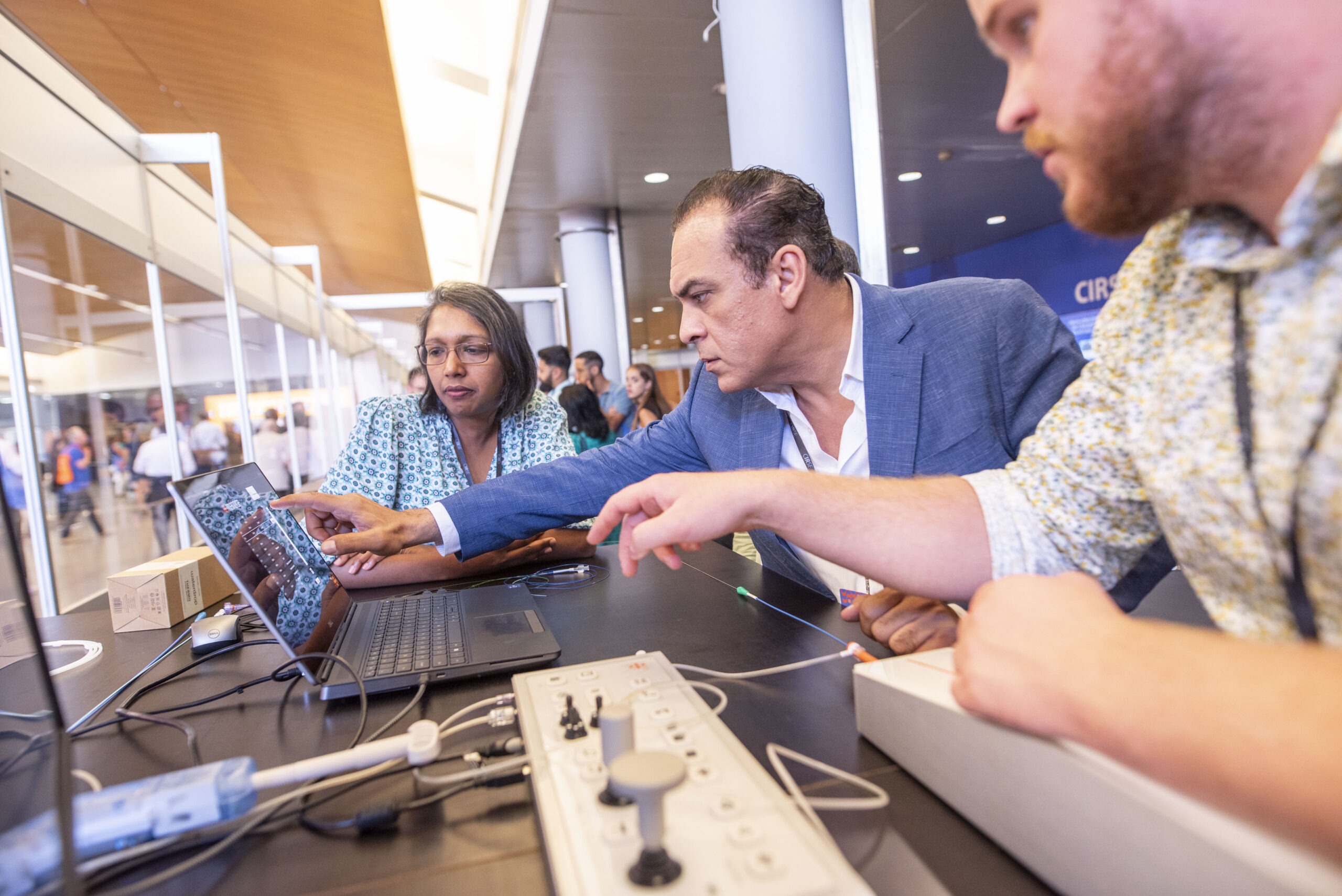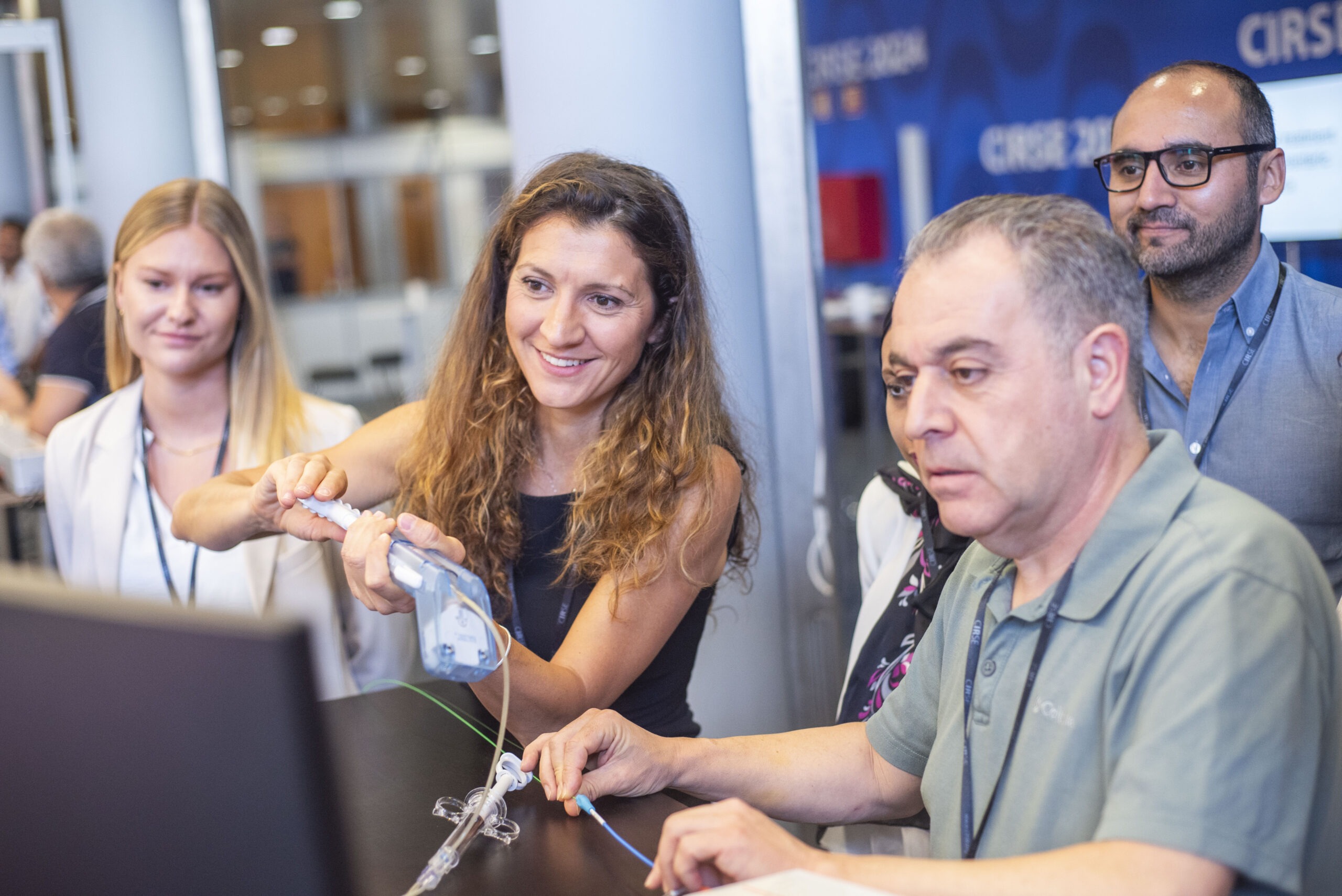Participants of the simulation training sessions can follow live demonstrations of interventional techniques and practice certain procedures under the guidance of an expert instructor and/or simulator technician.
Simulation training
This popular series of training sessions is comprised of a 20-minute round-table discussion facilitated by experts in the field delivering key knowledge and practical tips, followed by one hour of hands-on experience using high-fidelity simulators.
Each session is aimed at delegates with a specific level of experience (core, intermediate or advanced), and the delivery of each session is adaptable to respond to the delegates’ interests, with emphasis placed on small group teaching, allowing for close interaction with the expert faculty.
The round-table discussions are themed around learning objectives which relate to a specific clinical or procedural topic. Equipment and devices related to the specific topic will be available to demonstrate deployment techniques.
There will be six groups each day, including one session dedicated to students (ST-SIM).
How to participate
Participation will be free of charge for all registered CIRSE 2025 delegates, but places are limited and will be allocated on a first come, first served basis. Onsite registration starts 30 minutes before each individual session.
As these sessions offer practical medical training, participation is for qualified medical professionals only.
Session schedule
Coordinators
Peripheral arterial disease
S. Qanadli (Pully/CH)
Prostatic artery embolization
H. Hoppe (Bern/CH)
Acute and chronic mesenteric ischaemia
R. Kickuth (Würzburg/DE)
Uterine artery embolization
R. Das (London/GB)
SIM 1: PAD
Instructors: S. Awad (Paris/FR), P. Knüsel (Chur/CH), K. Rezaei-Kalantari (Tehran/IR), H. Derbel (Créteil/FR)
SIM 1.1: 08:30-09:50
SIM 1.2: 09:50-11:10
SIM 1.3: 11:10-12:30
Instructors: B. Arslan (Chicago/US), J. Alkoteesh (Abu Dhabi/AE), A. Chouiter (Neuchâtel/CH), M. Lahkim (Rabat/MA)
SIM 1.4: 14:00-15:20
SIM 1.5: 15:20-16:40
ST-SIM 1.6: 17:00-18:00 (dedicated to students)
Sessions 1-5 are comprised of a 20-minute round-table discussion and 60-minute simulation training.
The student session is comprised of about a 10-minute round-table discussion and 50-minute simulation training.
SIM 2: Prostatic artery embolization
Instructors: A. Kovács (Bonn/DE), K. Abd El Tawab (Cairo/EG), A. Lachner (Herznach/CH), I. Winzeler-Jörger (Winterthur/CH)
SIM 2.1: 08:30-09:50
SIM 2.2: 09:50-11:10
SIM 2.3: 11:10-12:30
Instructors: I. Insausti (Pamplona/ES), S. Kos (Lucerne/CH), O. Moschovaki-Zeiger (Athens/GR), G. Heymann (Bern/CH)
SIM 2.4: 14:00-15:20
SIM 2.5: 15:20-16:40
ST-SIM 2.6: 17:00-18:00 (dedicated to students)
Sessions 1-5 are comprised of a 20-minute round-table discussion and 60-minute simulation training.
The student session is comprised of about a 10-minute round-table discussion and 50-minute simulation training.
SIM 3: Acute or chronic mesenteric ischaemia
Instructors: K. Rippel (Augsburg/DE), K. Wilhelm (Bonn/DE), M. Sieren (Hamburg/DE)
SIM 3.1: 08:30-09:50
SIM 3.2: 09:50-11:10
SIM 3.3: 11:10-12:30
Instructors: R. Lauha (Helsinki/FI), K. Zelenak (Martin/SK), M. Ruffino (Lugano/CH), R. Adamus (Nürnberg/DE)
SIM 3.4: 14:00-15:20
SIM 3.5: 15:20-16:40
ST-SIM 3.6: 17:00-18:00 (dedicated to students)
Sessions 1-5 are comprised of a 20-minute round-table discussion and 60-minute simulation training.
The student session is comprised of about a 10-minute round-table discussion and 50-minute simulation training.
SIM 4: Uterine artery embolization
Instructors: Y. Gupta (Brighton/GB), P. Crowe (Birmingham/GB), P. Lohle (Tilburg/NL), T. Bilhim (Lisbon/PT)
SIM 4.1: 08:30-09:50
SIM 4.2: 09:50-11:10
SIM 4.3: 11:10-12:30
Instructors: M. Teixidor Viñas (Bellaterra/ES), J. Briggs (Berkshire/GB), S. Ameli Renani (London/GB), L. Mailli (London/GB)
SIM 4.4: 14:00-15:20
SIM 4.5: 15:20-16:40
ST-SIM 4.6: 17:00-18:00 (dedicated to students)
Sessions 1-5 are comprised of a 20-minute round-table discussion and 60-minute simulation training.
The student session is comprised of about a 10-minute round-table discussion and 50-minute simulation training.


